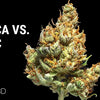As the legalization of cannabis-based products spreads across the country, certain types of products are booming in popularity. Of these, CBD products are among the most popular.
From oils and lotions to gummies and food supplements - people are taking advantage of the wide range of different ways of consuming the compound. The expanding array of companies that focus on different ways of taking CBD proves that its popularity is only going to continue to grow.
But there are still misconceptions when it comes to CBD, mostly due to its relation to cannabis and the assumptions that people often make because of it. One of these is the hunger often associated with marijuana - commonly known as the “munchies” . Is this something related to CBD? How can this affect weight gain? Let’s take a closer look.
Does CBD Cause Hunger and Weight-Gain?

So why is it so important that we highlight the endocannabinoid system and what has it got to do with any link between CBD and hunger?
CBD, as a natural cannabinoid, is similar in structure to those cannabinoids that can be found intrinsically within the human body. Due to this similarity, CBD is able to travel through the ECS and interact with the receptors along the way, therefore stimulating certain responses within the human body. So, can CBD make you hungry? The answer, quite simply, is no.
CBD cannot make you hungry directly. There are ongoing studies that suggest that the other effects of CBD may promote better appetite, however, these are not confirmed. But what we do know is that CBD does not create a feeling of hunger in and of itself.
CBD vs. THC
Known officially as Cannabidiol, CBD is just one of the many compounds and chemicals that exist naturally within the cannabis plant. The other famous compound that is widely known is Tetrahydrocannabinol, or THC.
THC is the compound responsible for the intoxicating effects of cannabis, or the “high” felt by those ingesting it. While THC is still under much harsher legal restrictions throughout the country due to its psychoactive qualities, CBD possesses none of these qualities and is less restrained by law.
CBD has many applications and is easy to dose, while also being incredibly flexible in terms of how it can be used. A quick search online for CBD products will show everything from flavored gummies to oils and food supplements. It seems that with increased legal freedoms, the possibilities behind CBD increase as well.
It’s important to know the difference between THC and CBD when discussing this issue.
How CBD and THC Affect the Appetite
THC, as we have already mentioned, is the psychoactive chemical that is also present in the cannabis plant, and most prevalently in the marijuana plant. It is responsible for the “high” that marijuana is so famous for. Unlike CBD, studies have shown that THC can directly increase a feeling of hunger by stimulating the body to produce more insulin, having the effect of rising levels of hunger in a person.
Many CBD products, however, have the natural THC content removed in the manufacturing process. Those CBD products that do maintain a certain level of THC as part of the makeup of the product, must keep this level of THC below 0.3% due to legal restrictions. Even if your CBD product contains THC, however, it is highly unlikely that it will be present in high enough quantities to stimulate feelings of hunger.
The Endocannabinoid System

Before we look a little deeper into whether there is a link between CBD and hunger, it’s important to first understand a little more about the ECS - or the endocannabinoid system.
This is a system that processes and interacts with many natural cannabinoids in order to activate certain responses in the human body, therefore achieving health benefits. All mammals have an endocannabinoid system, and as time goes by and more research is done on it, this system is showing an ever-growing list of effects.
The endocannabinoid system includes two receptors known as CB1 and CB2 receptors. These are located throughout the human body and are responsible for interacting with cannabinoids as they enter the body. They exist everywhere from the brain and the spinal cord, all the way to the gastrointestinal and urinary tracts.
When these receptors are triggered, they tell the systems within the human body to perform certain functions. For example, CB1 and CB2 receptors in the brain help let it know when to produce certain hormones that build up immune defenses.
There are a vast array of roles and effects that the endocannabinoid system is responsible for throughout the human body, and it’s important to know about these when talking about CBD.

Can You Take CBD to Boost Your Appetite?
CBD works with the endocannabinoid system to bring the body back into balance. As such, it is a piece of a larger puzzle and every person who takes it will feel that return to balance in different ways. If you are lacking appetite due to imbalances that are corrected by the endocannabinoid system (ECS), then in that way CBD can part of that larger healing process as it supports your ECS. However, it will never be sold and marketed as an appetite enhancer, because that's not its primary function.
Can CBD Oil Help You Lose Weight?
Similarly to the previous question, the answer must be person-specific. Trouble with excess weight or slow metabolism can be symptoms of larger imbalances in the body. CBD is not a stimulant that targets metabolism, but rather a substance that our bodies use in our ECS to maintain homeostasis. This means that coming into balance looks different for everybody. Imagine that someone is veering off the road toward the right side. To help them, you would say, "go left!" But if someone is veering to the left, you would say, "turn right!" CBD helps our endocannabinoid system come back to the middle.
Conclusion - Can CBD Make You Hungry?
So, will CBD cause you to feel hungry after ingesting it? Simply put, No. Or at least, not directly.
While some say that CBD can stimulate a healthy appetite, this by no means equates to increasing feelings of unsubstantiated hunger. Perhaps a clearer way of stating this is that while you may return to a healthier appetite once your ECS is more in balance, you will not get hungry simply because you’ve taken CBD.
As CBD travels through the endocannabinoid system, it interacts with various receptors throughout the human body, triggering specific responses. While there are many ways in which the ECS interacts with the body’s wellness, generating hunger is not known to be one of them.
So, while CBD can come in all kinds of tasty forms from oils, to gummies, candies and more — which can be tasty and satisfying — rest assured that the CBD itself will not lead to hunger or a desire to eat more.







